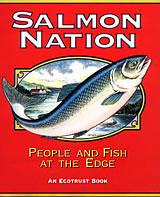Canada
-
Photos of B.C.’s renowned — and threatened — Great Bear Rainforest
The Great Bear Rainforest of British Columbia — home to the legendary white spirit bear, as well as huge grizzlies, rare wolves, countless salmon, and other wildlife galore — is one of the only remaining pristine regions of temperate rainforest left on earth. Take a virtual tour through this biological hotspot with the Raincoast Conservation […]
-
On climate change, other nations get cracking while the U.S. is slacking
The recent Milan conference on the Kyoto Protocol started out with a bang — a commotion of rumors about Russia’s ratification of the treaty — and went out with a whimper, offering no clear signal that the landmark accord on climate change would ever become international law. But one important development became clear amidst the […]
-
The Owl and the Pussycats
Canadian wilderness activists still can’t get over their astonishment or their delight over yesterday’s announcement by International Forest Products (Interfor) that it would halt all logging in spotted owl habitat in British Columbia, Canada. The company is the second-most active logger in the endangered owl’s terrain; not long ago it was considered Public Enemy No. […]
-
Don’t Send Us the Bill
The Canadian government prorogued its parliamentary session this week, effectively killing a proposed Species At Risk bill. The bill would have banned the harassment, harming, or killing of endangered species on federal land, as well as destruction of critical habitat. The move represented the third time the Parliament has tried and failed to pass legislation […]
-
Frog Days of Summer
For the first time, scientists have found evidence linking agricultural runoff to the rise in grotesque hind-limb deformities in frogs. In the past, the deformities were associated with a common parasite, the burrowing trematode worm, which seemed to affect the development of tadpoles. Now, writing in this week’s issue of the Proceedings of the National […]
-
The Name of the Haze
The U.S. National Weather Service has long maintained the tradition of giving names to hurricanes, but in Toronto, the environmental organization Greenpeace is taking matters one step further by naming excessively smoggy days after national politicians. The program is designed to call attention to the failure of the Canadian government to ratify the Kyoto Protocol […]
-
Do you know where your salmon comes from?
Thirty percent of the world's salmon now come from hatcheries, but wild fish account for only another twenty to thirty percent. Almost all of those wild fish come from waters around Alaska and British Columbia, northern waters where runs are mostly intact. These are the waters from which we harvest volumes comparable to those native people caught for thousands of years, that is, in those places largely unmanaged. The biggest share of the world's salmon consumption, however -- now forty to fifty percent -- comes from farmed fish, salmon raised and fed artificially in net pens their entire lives.
-
Forty
• percentage by which energy consumption in developing nations is expected to grow by 2010 • percentage of written prescriptions that are either based on or synthesized from natural compounds found in plants and animals • percentage of total paper used in Germany that goes toward packaging • percentage by which one can reduce pollution […]
